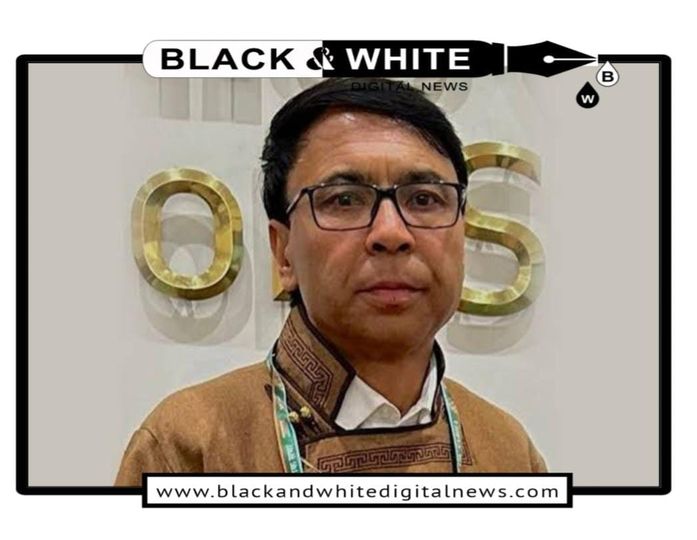Ladakh Should Be Governed by Ladakhis, Says MP Mohmad Haneefa; Demands Local Recruitment and Cultural Protection
||Black and White Digital News ||
||Tejveer Singh August 05,2024 ||
LADAKH: a poignant statement highlighting the administrative and cultural issues in Ladakh, Independent Member of Parliament (MP) Mohmad Haneefa has raised concerns about the lack of gazetted recruitment in the region since it became a Union Territory (UT) in 2019.
No Recruitment Since 2019:
Mr. Haneefa, who secured his parliamentary seat by defeating the Bharatiya Janata Party’s (BJP) candidate, emphasized that the cessation of the Public Service Commission in Ladakh has led to a complete halt in the recruitment of gazetted officers. This has significantly impacted the educated youth in Ladakh, who are now grappling with frustration and uncertainty regarding their career prospects. The MP stressed the need for age relaxation in recruitment processes to accommodate those affected by the delay.
Demand for Cultural and Job Protections:
The special status previously enjoyed by Jammu and Kashmir under Articles 370 and 35A, which was abrogated by Parliament on August 5, 2019, offered constitutional safeguards that protected jobs and land for locals. Since the abrogation and the bifurcation into UTs, Ladakhis have voiced their concerns over the erosion of these protections. Mr. Haneefa underscored the community’s desire for local governance to preserve Ladakhi culture, which is at risk due to potential demographic changes.
Civil Society Movements and Government Response:
In response to these challenges, two major civil society groups, the Leh Apex Body (LAB) and the Kargil Democratic Alliance (KDA), have united to demand statehood for Ladakh and its inclusion under the Sixth Schedule of the Constitution, which offers protection to tribal areas. They are also advocating for job reservations for locals and increased parliamentary representation. Despite the formation of a high-powered committee (HPC) by the government to address these grievances, Mr. Haneefa noted that meetings with Union Home Minister Amit Shah have not yielded positive results, and there has been a lack of further dialogue.
Local Residency Certificate and Job Advertisements:
Mr. Haneefa pointed out the ambiguity surrounding the Ladakh Resident Certificate (LRC) and its application in job recruitments. He mentioned that in a recent job advertisement by Ladakh University, the LRC was not mandatory, and the Scheduled Tribe quota was accessible to Jammu & Kashmir residents, creating dissatisfaction among Ladakhis. He also lamented the stagnation of promised educational infrastructure projects like medical and engineering colleges.
Preservation of Ladakhi Culture:
The MP expressed a profound concern over the potential erosion of Ladakhi culture due to the influx of outsiders. He highlighted the delicate balance of the region’s population and the threat posed by a significant number of non-locals settling in Ladakh.
Call for Constructive Dialogue:
Looking ahead, Mr. Haneefa urged for a renewed dialogue between civil society leaders and the government to find a viable solution to these pressing issues. He emphasized that continuous agitation is detrimental not just for Ladakh but for the country as a whole.
Background on Ladakh’s Political Status:
Ladakh, historically part of the state of Jammu and Kashmir, was designated a Union Territory on August 5, 2019, following the abrogation of Article 370. This move by the Indian government removed the special status that provided certain constitutional protections to the region. The reorganization led to the dissolution of the legislative assembly in Ladakh, thereby centralizing administrative control under the Union government.
Impact of Administrative Changes:
The administrative overhaul has resulted in the discontinuation of the Public Service Commission in Ladakh, halting gazetted recruitments. This has left many graduates and postgraduates in the region without employment opportunities, causing widespread frustration. The lack of clarity on the Ladakh Resident Certificate (LRC) and its necessity for job applications has further exacerbated the problem, leading to dissatisfaction among locals who feel their job opportunities are being unfairly opened to residents of Jammu & Kashmir.
Cultural Concerns and Demographic Shifts:
Ladakhis fear that the influx of non-local settlers could lead to the erosion of their unique culture. With a population of around four lakh, the entry of a significant number of outsiders is seen as a threat to the local way of life and cultural identity. This has led to calls for greater local governance to ensure that Ladakhi culture and traditions are preserved.
Civil Society’s Role and Government Response:
The Leh Apex Body (LAB) and the Kargil Democratic Alliance (KDA) have been instrumental in voicing the concerns of Ladakhis. These groups have called for statehood and inclusion under the Sixth Schedule of the Constitution to secure job reservations for locals and protect their cultural heritage. Despite the formation of a high-powered committee to address these issues, progress has been slow, with civil society leaders expressing disappointment over the lack of tangible outcomes from their meetings with government officials.
MP Mohmad Haneefa’s call for renewed dialogue underscores the need for a collaborative approach to resolve the region’s issues. Constructive engagement between the government and civil society is crucial to address the administrative and cultural concerns in Ladakh. Ensuring that Ladakhis have a say in their governance and that their cultural identity is protected will be key to achieving lasting peace and development in the region.



